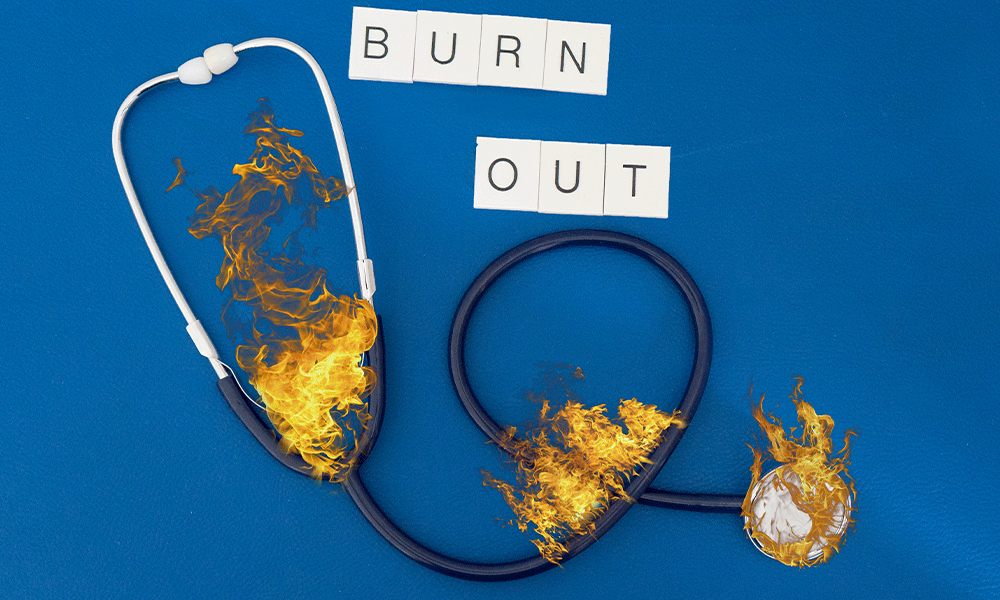Burnout's impact on patient care
One woman's story illustrates the importance of patient care, even when you're burned out.

On October 12th, 2020, I reluctantly entered an emergency room with significant abdominal pain, nausea, and chest pain. While I have suffered from gastrointestinal issues for the past thirty years, for some reason, this time, this was different, and I have a very significant pain tolerance. Pain and nausea have been part of my everyday routine since I entered my first GI suite in the early 2000s. I have had roughly twelve or more abdominal surgeries; some were scheduled, and some were emergency. I’ve lost organs and pregnancies. I’ve had organs cut in operations in error, causing sepsis. I have entered some of the best medical facilities in the world and been seen by the most prestigious doctors. I have a bit of patient experience and know my body.
I did not want to go to any emergency room during a pandemic. When we arrived, security stopped us at the door. This was October 2020; as a patient, the only option during a pandemic is to drop off. This places you alone and at the mercy of those working that evening shift. I was so uncomfortable that my entire body was uncontrollably shaking as if I were having a panic attack, but it was a stress reaction to the pain. Each person in the waiting room was six feet apart, masked, and looked helpless. I was put in a wheelchair and handed a throw-up bag. Within about an hour, I found myself in triage and trying to go over my long and complicated medical history while trying to breathe. I was in the emergency room for seven hours, and they were not slammed with patients. Unfortunately, the doctor in charge of my case failed to run a CBC. I was given pain medication and nausea meds, and they did an endoscopy around midnight. Eventually, I was told, “everything was fine.” My discharge papers were brought in, and a nurse unhooked all my vitals. At this point, I learned what code grey was in a hospital.
While I could not easily move to access my phone, I told the nurse and doctor that “this was ridiculous, and something was really wrong.” During this emotional exchange, I became a code grey. Code Gray indicates a combative or aggressive person, requiring security personnel. I was never a threat; I was dying. At that point, I got up to go to the bathroom, and luckily, I passed out and woke up with the same nurse that deemed me combative, flooding my body with fluids because my blood pressure was 76/30 and my bpm was roughly 130.
My condition was rare. However, a routine CBC or cat scan would have shown something was wrong. My ultimate diagnosis was gastric volvulus. My stomach had flipped, torn off my spleen, and I was bleeding internally. I found all of this out two days later when I woke up in ICU.
I’m not the first person that has experienced this type of medical mistake, and I will not be the last. A trauma surgeon saved my life, and I am forever grateful.
What can I offer to those that have taken the oath and made the sacrifice to work in healthcare:
- Always listen to your patients
- Even under extreme stress of a pandemic, staffing issues, or everyday pressures, people, in general, do not want to be in an emergency room
- This diagnosis is rare for someone my age, but if I did not pass out, I would not have woken up the next day at home because of an incorrect discharge
- I can’t imagine what you have been through since February of 2020 and continue to go through with the stressors of the job, oversight, mandates, policies, corporate bureaucracy, and loss, but please don’t lose your reason for choosing an occupation to help and treat illness.
- One person can make a difference, as did the surgeon that saved my life and the hospitalist that took over my case to ensure a thorough workup.
- If a patient becomes a “code grey,” it may be because they are in extreme pain and not trying to be combative.I knew I had no control over the situation and was dying alone.
- My case became the “case of the month” for this facility.My surgical team told me they had never seen such a case in their tenor, and I was lucky to have survived it. Learn from me.
- In situations where the patient is alone due to the lack of family support or, in my case, pandemic rules, please listen to the family members the best you can because they can offer you critical information that the patient may not be able to.
Melissa Mullamphy is a psychologist, health care expert, advocate, and critically acclaimed author of Not in Vain, A Promise Kept. After earning a degree in counseling psychology, she worked in a psychiatric emergency room and headed up various non-profit events and organizations before turning to the corporate world and working as Domestic Operations Manager for one of Warren Buffet’s companies, General Re for nearly two decades. For more information visit melissamullamphy.com